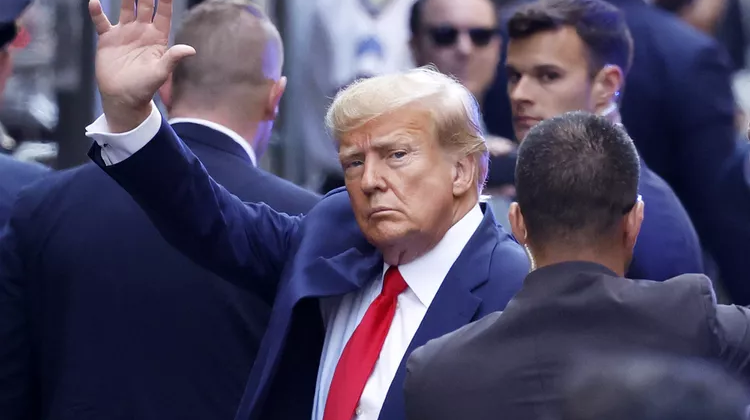Trump is Charged Under a Law Meant to Suppress Political Opposition: Democrats have used the ‘Espionage Act’ to silence opponents for over 100 years.; 6 Reasons DOJ’s ‘Get Trump’ Documents Case Is Seriously Flawed
Trump is Charged Under a Law Meant to Suppress Political Opposition:
Democrats have used the ‘Espionage Act’ to silence opponents for over 100 years.
A year after the start of WWI, President Woodrow Wilson addressed his message to Congress and warned that the “gravest threats against our national peace and safety” did not come from “other governments”, but from “within our own borders”.
“Citizens of the United States,” Wilson continued, “born under other flags but welcomed under our generous naturalization laws to the full freedom and opportunity of America, who have poured the poison of disloyalty into the very arteries of our national life.”
Wilson, a notorious racist and a supporter of the KKK who had contempt for a wide variety of other peoples, likely had German immigrants, but not just them, in mind when he called for what would become the Espionage Act so that “we may be purged of their corrupt distempers.”
“I need not suggest the terms in which they may be dealt with,” Wilson concluded.
While there were indeed pro-German terrorist conspiracies in those days, including the Black Tom bombing which damaged the Statue of Liberty and a plot to infect the country’s horses, the Espionage Act of 1917 went far beyond prosecuting criminal activities. Wilson had sought, but not received, the power to censor the press, he did get the power to censor the mail.
Most of those prosecuted under the Espionage Act were not terrorists, but political opponents of the war. They included leftist socialists like Charles Schenck whose Supreme Court case birthed the misleading cliche about “shouting fire in a crowded theater”, as well as Robert Goldstein, a filmmaker whose crime was making a movie, ‘The Spirit of ’76’, about the American Revolution.
Also prosecuted under the Espionage Act were members of the Watch Tower Society for their religious pacifism. This was described as almost “the only time in American history when almost all the leaders of a denomination were in jail”.
When former President Trump was indicted under the Espionage Act, he was being targeted by a law that from its very inception had been created to suppress the political opposition. While elements of the Espionage Act were watered down over the years and only media hacks still quote “shouting fire in a crowded theater” as if it were standing law, that hasn’t really changed. —>READ MORE HERE
6 Reasons DOJ’s ‘Get Trump’ Documents Case Is Seriously Flawed:
Proving a defendant’s intent and knowledge can often be tough. But it’s even tougher here because of the Presidential Records Act.
Proving a defendant’s intent and knowledge can often be tough. But it’s even tougher here because of the Presidential Records Act.
I am a former assistant U.S. attorney, worked on two Supreme Court confirmations, and clerked for two federal appellate judges. I have reviewed the indictment brought by Special Counsel Jack Smith in the documents case against former President Donald Trump, and have serious concerns with the way this case is being framed in the public and with some aspects of the way the prosecution itself is being conducted.
Here are six major issues I see that need to be addressed by the special counsel’s team.
1. Interplay Between the Espionage Act and the Presidential Records Act
Others have already spoken insightfully about the scope of the Presidential Records Act (PRA). Mike Davis of the Article III Project has published and spoken on the subject, and Michael Bekesha of Judicial Watch had a fascinating article in The Wall Street Journal detailing his experience litigating the Clinton Sock Drawer Case.
Basically, their argument distills down to the idea that the president’s authority to retain personal records, as well as his rights to access his presidential records, make it impossible to prosecute him under the Espionage Act section at issue here, § 793(e), because the government cannot prove “unauthorized possession,” as required under the statute.
I want to make a different point relating to the intent element of the Espionage Act, the statute Trump is being charged under.
Section 793(e) requires the government to prove that the defendant knew he had National Defense Information (NDI) in his possession, knew there was a government official entitled to receive the information, and then willfully failed to deliver it to that official.
This is a very high set of mens rea bars to jump in any circumstance. Proving a defendant’s intent and knowledge can often be tough. But it’s even tougher here because of the Presidential Records Act.
The Presidential Records Act sets up a system where the president designates all records that he creates either as presidential or personal records (44 U.S.C. § 2203(b)). A former president is supposed to turn over his presidential records to the National Archives and Records Administration (NARA), and he has the right to keep his personal records.
Based on the documents I’ve read and his actions I’ve read about, I believe Trump viewed his “boxes” as his personal records under the PRA. There are statements he made, quoted in the indictment, that support that view. If Trump considered the contents of these boxes to be of purely personal interest, hence his designation of them as personal records, did he knowingly retain NDI?
Did he really think these documents, like years-old briefing notes and random maps, jumbled together with his letters, news clippings, scribbled notes, and random miscellaneous items, “could be used to the injury of the United States”? Or did he just think of them as mementos of his time in office, his personal records of the four years, akin to a journal or diary? —>LOTS MORE HERE







Comments are closed.